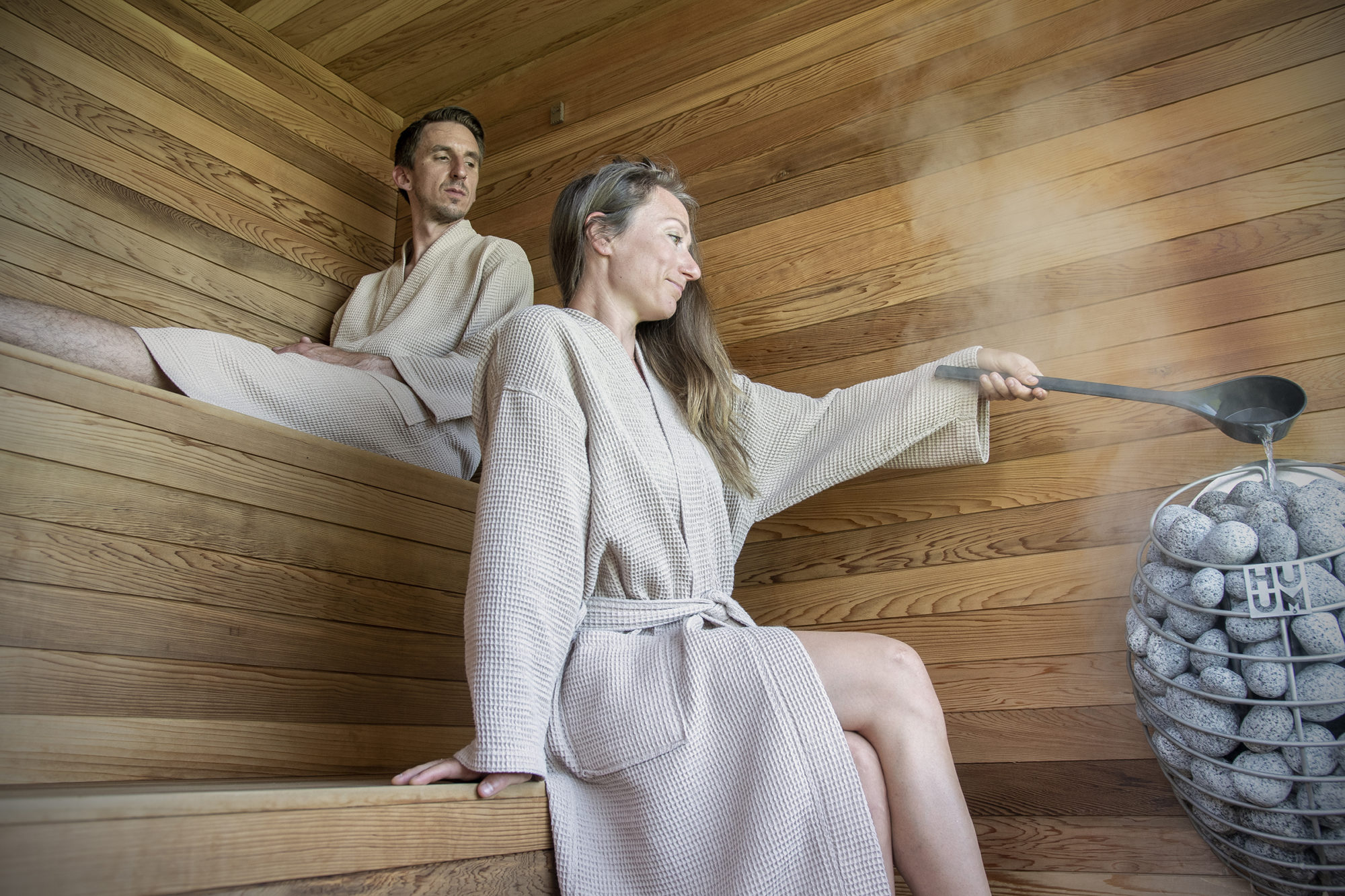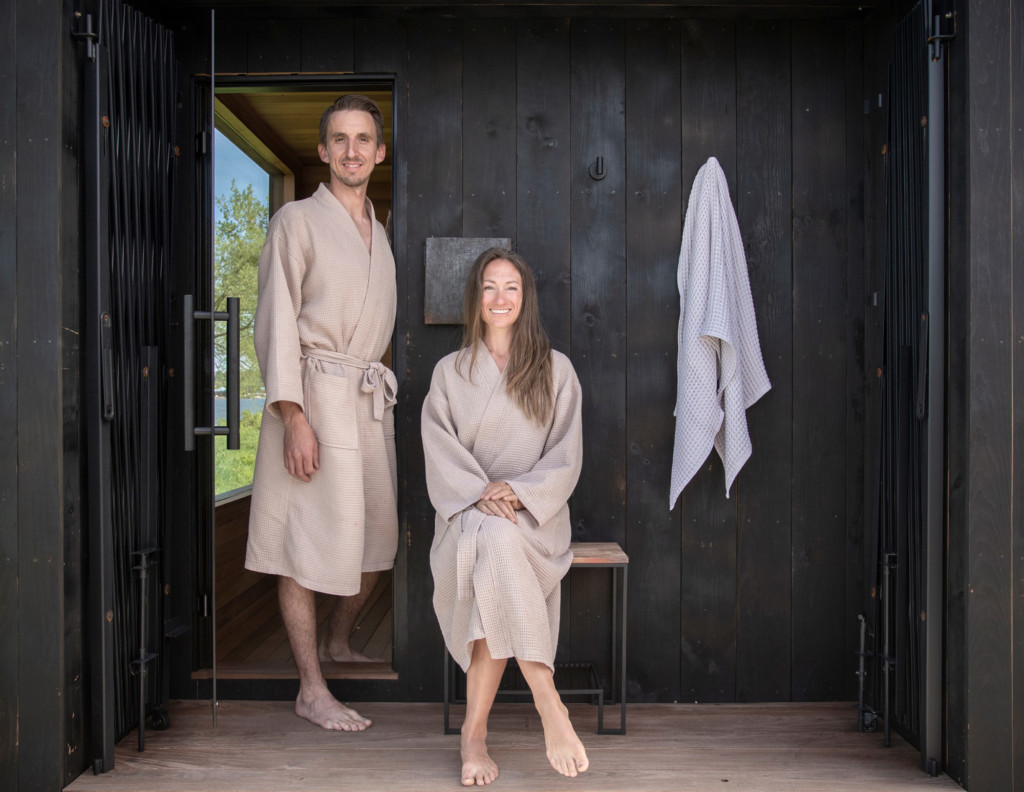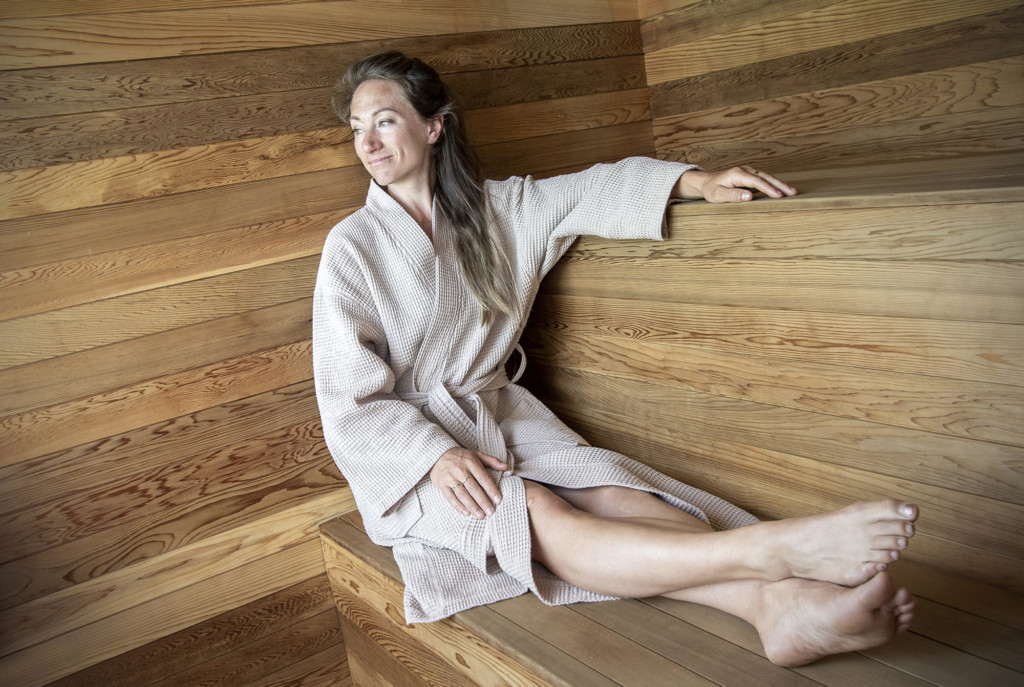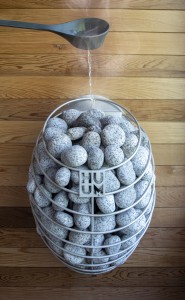SAVU Sauna Experience Begins in Vermont Forest
July 01, 2022

By Christine McGowan, Vermont Forest Industry Network
Dave Nelson is on a mission to bring sauna culture to the United States. With his partner, Nicole Sweeney, Nelson founded SAVU in Cambridge, Vermont with the construction of a contemporary sauna nestled in the woods overlooking Smugglers’ Notch.
“We are creating a modern sauna experience that celebrates being outdoors,” said Nelson. “The connection to nature is something we felt was missing from traditional sauna experiences.”
Saunas, also known as sweat baths, have been used for centuries to promote healing—a practice Nelson began to explore as a competitive athlete. But, he says, most sauna experiences are culturally specific, with nods to Turkish, Russian, and Japanese roots, and typically communal, which can be intimidating to the uninitiated.
“We felt there was an opportunity to create something uniquely American,” said Nelson. “Our customer prefers a private sauna and a contemporary aesthetic with an emphasis on nature and wellness as opposed to communal sweat bathing.” He envisions a network of sauna experiences around the country and is exploring a pop-up model, in which their saunas are placed in stunning outdoor locations and rented by the hour.
Connecting to Nature
Winding up a residential dirt road in Cambridge, Vermont, one could easily imagine they were lost, until they come across a small sign leading guests to a cluster of compact, modern structures among the trees overlooking a sweeping view of the mountains. In addition to the sauna, the SAVU experience in Cambridge offers a changing room, outdoor fire pit, and cold water from a spring-fed well on the property to cool off.
Sitting above co-founder Nicole Sweeney’s family home, guests have an unobstructed view of the surrounding forest and nearby Smugglers’ Notch. Her dad, Pete Sweeney, co-owner of Sweeney & Belisle Construction, helped build the initial prototype sauna that is still in use today. A family affair, Sweeney’s mom, Kӓren, greets guests with robes, sandals, and firewood encouraging them to bring snacks and linger while enjoying the view.

Savu co-founders Dave Nelson and Nicole Sweeney are committed to creating saunas with lumber sourced locally—their main suppliers are RK Miles and Rice Lumber—hiring local labor and paying a livable wage. Photo by Erica Houskeeper.
Since opening the site in Jeffersonville, Savu has launched a second location on the Lake Champlain waterfront. In partnership with Vermont-based VC fund and start-up accelerator, Hula, Savu operates two saunas adjacent to the Hula co-working space and the Burlington Surf Club.
“We hope that by creating opportunities for people to experience the world around them while they are calm and relaxed, we might motivate them to think differently about sustainability,” said Nelson.
Local labor, local lumber
For their part, Nelson and Sweeney are committed to buildings that are “designed with intention to protect the earth, locally sourced, and ethically built.” That means sourcing lumber locally (their main suppliers are RK Miles and Rice Lumber), hiring local labor, and paying a liveable wage. The saunas are currently built by local contractors and the company is looking to hire both a master and apprentice sauna builder to meet growing demand.
Offering a “liveable wage and lifestyle,” Nelson would like to fill the positions with talented carpenters willing to take on production efficiency as the company grows—though he would hire the right apprentice regardless of experience. “Right now, it takes 80 hours to build a sauna,” he said. “I’d like to cut that in half over a couple of years.” As an athlete, Nelson’s mindset as a business owner is to find the small adjustments that improve performance, and he’s optimistic that efficiency will be a competitive edge for the company.

Savu co-founder Nicole Sweeney, an architect by training, relaxes in a Savu sauna outside of Hula in Burlington. Photo by Erica Houskeeper.
Far from a mass production model, however, Nelson says no two saunas are ever exactly the same. “We love the natural aspects of the wood and the fact that every sauna comes out just slightly differently,” he said. “When you have craftsmen who can match grains and build joints that come together without trim, the end effect is really striking.”

The company decided on more widely available western red cedar to build out the interiors for the time being, and continues to look for a local source. Photo by Erica Houskeeper.
One of the biggest challenges faced by the young company has been sourcing local materials during the pandemic. Wood, and particularly cedar, is a natural choice for sauna construction, as its heat conductivity properties allow guests to sit comfortably while the room heats to 200 degrees.
“Our first choice is eastern white cedar,” said Nelson, “but even with Pete in our corner, we couldn’t find a reliable, affordable local supplier at the quantities we need. The lead times were three to six months and, as a self-funded startup with an extremely limited budget, we just couldn’t afford to wait or pay the premium.” The company decided on more widely available western red cedar to build out the interiors for the time being, but continues to look for a local source.
“I’m not an expert on sourcing lumber, but one of the things I’m learning about this industry is it’s so much about your network,” said Nelson.
Nelson credits his partner, Nicole, an architect by training whose previous job was creating displays for the national brand Anthropologie on a very limited budget, with the company’s approach to aesthetics. “Her experience with art and design formed how we think about this business,” said Nelson. “Our goal is to use simple materials to create something really beautiful.”
Healing Benefits
Of course, SAVU is not only—or even primarily—about beautiful settings and sustainable materials; it’s about the health and wellness benefits of sweat bathing.
“The basic physiology is simple,” explained Nelson, who has a bachelor of science in human anatomy and physiology. “When the body experiences extreme heat, as in a sauna, it pushes twenty to thirty percent of your blood out to the extremities to protect your core body temperature. There is evidence-based research that links this process to increased metabolism, which helps with weight loss, and improved vascular elasticity, which leads to heart and circulatory health.”
When coupled with a cold plunge, the sauna experience produces a redirection of blood flow, also known as “shunting,” in which the opposite happens. As the body’s core temperature is lowered, blood flows back to the core to preserve heat. “This process causes the blood vessels in your muscles and skin to open up,” said Nelson, “increasing circulation in your smallest blood vessels by up to 200 percent and facilitating cellular flushing and faster recovery.”
“Saunas can be part of a training or wellness routine,” said Nelson, “but we also hear from customers that they enjoy just sitting, relaxed and free of distractions, and immersed in the natural world.”
To learn more, or to book a sauna experience, please visit www.savu.cc.
About the Vermont Forest Products Program at VSJF
Vermont’s forest economy contributes more than $2 billion in direct economic output and provides more than 13,000 jobs in forestry, logging, processing, specialty woodworking, construction, wood heating, maple production, and forest-based recreation. The Forest Products Program at the Vermont Sustainable Jobs Fund (VSJF) creates space for strong relationships and collaboration throughout the industry and promotes the development of new and existing markets for Vermont wood products. Committed to nurturing the sustainable development of Vermont’s economy, VSJF provides business assistance, network development, strategic planning, and value chain facilitation in agriculture and food system, forest products, waste management, renewable energy, and environmental technology sectors. Learn more at www.vsjf.org.




